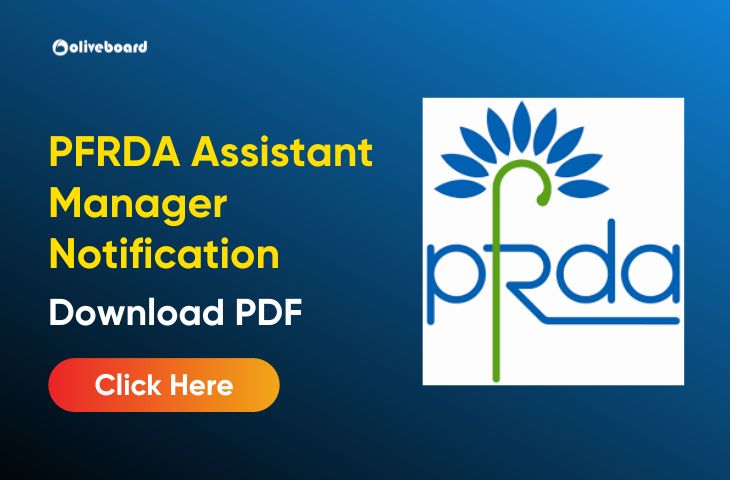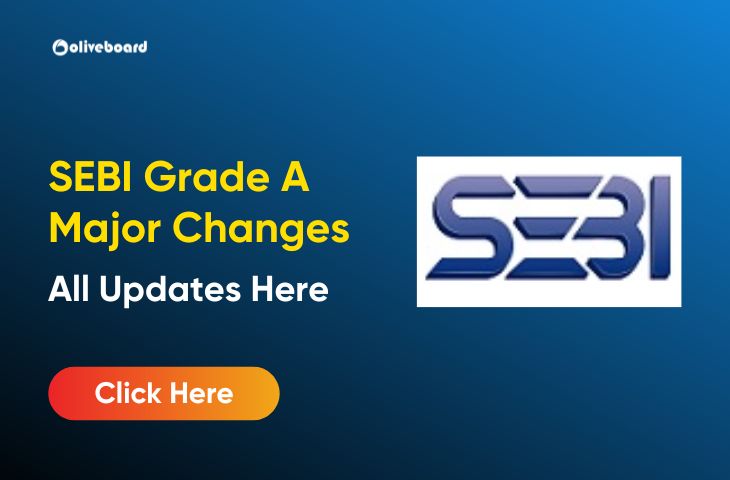SEBI Grade A Major Changes
From 11th June 2024, the Securities and Exchange Board of India (SEBI) has invited applications from the interested and eligible candidates for the post of Grade A Officers. The SEBI Grade A Notification 2024 in the detailed version has been released on the official website and this year, we have seen significant changes. In this blog, we will discuss all the SEBI Grade A Major Changes that have been made in the notification.
SEBI Grade A Major Changes 2024
Let’s discuss all the SEBI Grade A Major Changes in this section by comparing the previous information and the current information in the table below:
| Parameters of SEBI Grade A Major Changes | According to Previous Notifications | According to 2024 Notifications |
| Salary | As Per SEBI Advance Intimation Without Accommodation – Rs 1,49,500 With Accommodation – Rs 1,11,000 | As per SEBI Detailed Notification Without Accommodation – Rs 1,55,000 With Accommodation – Rs 1,16,500 |
| Syllabus (For Paper 2 of Phase 2 in IT Stream) | Earlier there were three topics with 40, 40, 20 marks weightage. | Now, there are four topics with 30, 40, 10 and 20 marks weightage. |
| Time Duration (Paper 2 of Phase 2) | General Stream: 40 minutes IT Stream: 180 minutes Research Stream: 40 minutes Official Language Stream: 40 minutes | General Stream: 90 minutes IT Stream: 210 minutes Research Stream: 120 minutes Official Language Stream: 90 minutes |
| Streams | Earlier there were 5 streams i.e. General Stream, Legal Stream, Information Technology Stream, Research Stream and Official Language Stream | Now there are 6 streams i.e. General Stream, Legal Stream, Information Technology Stream, Research Stream, Engineering (Electrical) and Official Language Stream |
Download SEBI Grade A 300+ MCQs Ebook
SEBI Grade A Major Change in Syllabus
As mentioned in the table above, there are some changes in Paper 2 of Phase 2 for the IT Stream, so in this section we will provide you the detailed syllabus from previous notification and current notification. The table given below is from the previous year notification.
| Topic | Concept | Weightage |
| Algorithms | Sorting, Searching, Greedy Algorithms, Dynamic Programming, Backtracking, Divide and Conquer, Pattern Searching | 40 |
| Data Structure | Array, Linked List, Stack, Queue, Binary Tree, Indexing, Binary Search Tree, Heap, Hashing, Matrix | 40 |
| String Manipulation | Length, Substring, Regex, Search | 20 |
SEBI Grade A New IT Syllabus
The table given below is the new SEBI IT Syllabus. Here, the candidates can see that one topic has been increased and weightage of topics has also been changed.
| Topic | Concept | Weightage |
| Algorithms | Sorting, Searching, Greedy Algorithms, Dynamic Programming, Backtracking, Divide and Conquer, Pattern Searching | 30 |
| Data Structure | Array, Linked List, Stack, Queue, Binary Tree, Indexing, Binary Search Tree, Heap, Hashing, Matrix | 40 |
| String Manipulation | Length, Substring, Regex, Search | 10 |
| Object Oriented Programming | Abstraction, Encapsulation, Polymorphism, Inheritance | 20 |
Download SEBI Grade A 350+ PYQs with Solutions PDF
SEBI Grade A Syllabus for New Stream (Engineering Electrical)
This year, the vacancies have been released for engineering electrical stream as well. So below, we have provided the syllabus of the same.
| Topics | SEBI Grade A Engineering Electrical Stream Syllabus |
| Electrical Materials | Electrical Engineering Materials, crystal structures and defects, ceramic materials, insulating materials, magnetic materials – basics, properties and applications; ferrities, ferro-magnetic materials and components; basics of solid state physics, conductors; Photo-conductivity; Basics of Nano materials and Superconductors. |
| Electric Circuits and Fields | Circuit elements, network graph, KCL, KVL, Node and Mesh analysis, ideal current and voltage sources, Thevenin’s, Norton’s, Superposition and Maximum Power Transfer theorems, transient response of DC and AC networks, Sinusoidal steady state analysis, basic filter concepts, two-port networks, three phase circuits, Magnetically coupled circuits, Gauss Theorem, electric field and potential due to point, line, plane and spherical charge distributions, Ampere’s and Biot-Savart’s laws; inductance, dielectrics, capacitance; Maxwell’s equations. |
| Electrical and Electronic Measurements: | Principles of measurement, accuracy, precision and standards; Bridges and potentiometers; moving coil, moving iron, dynamometer and induction type instruments, measurement of voltage, current, power, energy and power factor, instrument transformers, digital voltmeters and multi-meters, phase, time and frequency measurement, Q-meters, oscilloscopes, potentiometric recorders, error analysis, Basics of sensors, Transducers, basics of data acquisition systems. |
| Computer Fundamentals | Number systems, Boolean algebra, arithmetic functions, Basic Architecture, Central Processing Unit, I/O and Memory Organisation; peripheral devices, data representation and programming, basics of Operating system and networking, virtual memory, file systems; Elements of programming languages, typical examples. |
| Basic Electronics Engineering | Basics of Semiconductor diodes and transistors and characteristics, Junction and field effect transistors (BJT, FET and MOSFETS), different types of transistor amplifiers, equivalent circuits and frequency response; oscillators and other circuits, feedback amplifiers. |
| Analog and Digital Electronics | Operational amplifiers – characteristics and applications, combinational and sequential logic circuits, multiplexers, multi-vibrators, sample and hold circuits, A/D and D/A converters, basics of filter circuits and applications, simple active filters; Microprocessor basics- interfaces and applications, basics of linear integrated circuits; Analog communication basics, Modulation and de modulation, noise and bandwidth, transmitters and receivers, signal to noise ratio, digital communication basics, sampling, quantizing, coding, frequency and time domain multiplexing, power line carrier communication systems. |
| Systems and Signal Processing | Representation of continuous and discrete-time signals, shifting and scaling operations, linear, time-invariant and causal systems, Fourier series representation of continuous periodic signals, sampling theorem, Fourier and Laplace transforms, Z transforms, Discrete Fourier transform, FFT, linear convolution, discrete cosine transform, FIR filter, IIR filter, bilinear transformation. |
| Control Systems | Principles of feedback, transfer function, block diagrams and signal flow graphs, steadystate errors, transforms and their applications; Routh-hurwitz criterion, Nyquist techniques, Bode plots, root loci, lag, lead and lead-lag compensation, stability analysis, transient and frequency response analysis, state space model, state transition matrix, controllability and observability, linear state variable feedback, PID and industrial controllers. |
| Electrical Machines | Single phase transformers, three phase transformers – connections, parallel operation, auto-transformer, energy conversion principles, DC machines – types, windings, generator characteristics, armature reaction and commutation, starting and speed control of motors, Induction motors – principles, types, performance characteristics, starting and speed control, Synchronous machines – performance, regulation, parallel operation of generators, motor starting, characteristics and applications, servo and stepper motors. |
| Power Systems | Basic power generation concepts, steam, gas and water turbines, transmission line models and performance, cable performance, insulation, corona and radio interference, power factor correction, symmetrical components, fault analysis, principles of protection systems, basics of solid state relays and digital protection; Circuit breakers, Radial and ring-main distribution systems, Matrix representation of power systems, load flow analysis, voltage control and economic operation, System stability concepts, Swing curves and equal area criterion. HVDC transmission and FACTS concepts, Concepts of power system dynamics, distributed generation, solar and wind power, smart grid concepts, environmental implications, fundamentals of power economics. |
| Power Electronics and Drives | Semiconductor power diodes, transistors, thyristors, triacs, GTOs, MOSFETs and IGBTs – static characteristics and principles of operation, triggering circuits, phase control rectifiers, bridge converters – fully controlled and half controlled, principles of choppers and inverters, basis concepts of adjustable speed dc and ac drives, DC-DC switched mode converters, DC-AC switched mode converters, resonant converters, high frequency inductors and transformers, power supplies. |
Preparing for Regulatory Exams? Need regular updates of CA, Notifications, Free Ebooks, YT Sessions, and More, then Join Regulatory Whatsapp Channel.
If you are preparing for Regulatory Exams, then do not forget to check out all the blogs on the regulatory exams. Check Regulatory Exam Blogs.
Get Daily FREE Material for RBI Grade B, NABARD Grade A, SEBI Grade A, IFSCA Grade A, and SIDBI Grade A, IRDAI Assistant Manager – Join Regulatory Exam Telegram Channel
Attempt Engaging Quiz on YTC and get complete study material and classes for RBI Grade B, NABARD Grade A, SEBI Grade A, IFSCA Grade A, and SIDBI Grade A, IRDAI Assistant Manager- Subscribe to Oliveboard’s Regulatory Exam Youtube Channel
- Is It Essential to Join Coaching for RBI Grade B Preparation?

- PFRDA Grade A Apply Online 2025 for Assistant Manager Post

- PFRDA Grade A Notification 2025 Released for 40 Vacancies

- CCI Last Minute Revision Plan for 8th July 2025, Check Tips

- Effective Study Strategies for the PFRDA Grade A Statistics

- PFRDA Grade A Lifestyle in 2025, Their Growth and Benefits


Hello there! I’m a dedicated Government Job aspirant turned passionate writer & content marketer. My blogs are a one-stop destination for accurate and comprehensive information on exams like Regulatory Bodies, Banking, SSC, State PSCs, and more. I’m on a mission to provide you with all the details you need, conveniently in one place. When I’m not writing and marketing, you’ll find me happily experimenting in the kitchen, cooking up delightful treats. Join me on this journey of knowledge and flavors!
